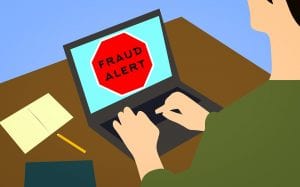Most small businesses are slow to take advantage of the technological resources that are available to fight certain types of fraud
The very definition of fraud includes many different actions that can take place when people have the intention of scamming someone else. This usually results in individuals obtaining either money or personal gains while affecting someone else. Unfortunately, fraud is not an unusual occurrence, and many people fall victim to it every year.
When it comes to business fraud, these actions can be undertaken by either individuals or companies who are looking for a financial gain. As well, many of these schemes take the form of a legitimate business.
What are some examples of business fraud?
There are many examples of business fraud, here are just some of them:
Merchandise Not Delivered
This happens mostly when the customer purchases something online, the money exchanges hands, and the goods are never delivered.
Merchandise Not Paid For
The other end of the above scam happens when goods are shipped but payment is never received.
Charity Fraud
Taking advantage of a natural disaster, individuals are made to believe they are donating to a charity that will help those affected by it, but that charity does not exist. Or, people may make a donation to a charity they are familiar with but the website is slightly altered and the funds end up in someone’s pocket.
Identity Theft

Individuals committing this fraud may steal a business identity and gain access to its funds and its credit. They may get their hands on a business’ federal tax identification number, bank statements, or other documents and take actions to defraud the business.
Payroll Fraud
Small businesses in particular very often fall victim to this type of fraud. Employees may request cash advances and not repay the money; they may lie about the number of hours they worked or even have a coworker clock in for them when they don’t show up to work.
Money Fraud
This refers to the fact that there is a large amount of illegal cash circulating in the United States in the shape of fake bills. This type of fraud can happen without anyone noticing. The business accepts the fake bills and when they are deposited in the bank, they find out that their money is worthless.
Fighting Business Fraud
If you are a business owner and are dealing with falsified invoices, inflated expense reimbursements, billing schemes, problems with checks getting altered, or any other type of fraud, you must be wondering two things: when this fraud started happening and what to do to prevent it from happening again. However, you must also wish to know how much time and resources you must allocate to implementing preventive controls. Or, whether it is reasonable to continuously monitor everything that is going on in your business in a reasonable and effective manner.
Most small businesses are slow to take advantage of the technological resources that are available to fight certain types of fraud. This may be due to the cost involved when considering fraud prevention software. And, they may also worry that relying too much on technology would increase their exposure to fraud through data breaches.
If your business has been the victim of fraud, you should seek legal help as soon as possible. Click here for more information on how to fight fraud in your business and put an end to it once and for all.


Join the conversation!